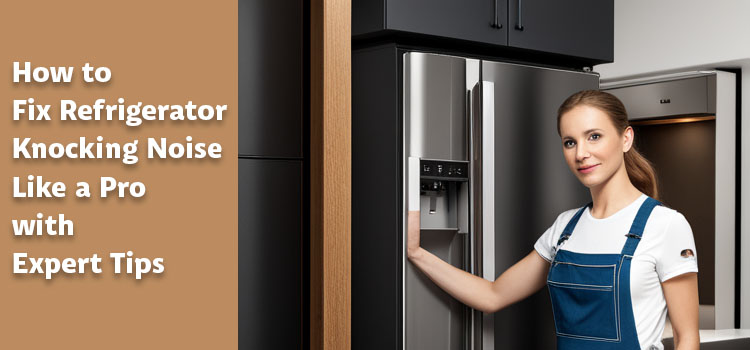As an Amazon Associate, I earn from qualifying purchases
Solving Refrigerator Knocking Noise: Expert Tips &
Troubleshooting 2024

A knocking noise coming from your refrigerator can transform the heart of your home from a place of culinary creativity to a room filled with concern. Before you panic, understanding how to fix refrigerator knocking noise is crucial. This issue, while annoying, is often more intimidating in sound than cause. In this comprehensive guide, we will walk you through expert tips and troubleshooting steps to quiet your appliance, ensuring peace returns to your kitchen in 2024.
Understanding the Source of Refrigerator Knocking Noise
Before we dive into solutions, it’s essential to identify where that distracting noise is coming from. Various components of your refrigerator can be culprits, including the compressor, evaporator fans, defrost timer, or even ice maker issues. Recognizing the type of noise and its source can significantly narrow down the potential issues and solutions.
Common Causes and Fixes
- Compressor Issues: A worn-out compressor can make a knocking sound as it struggles to maintain temperature. This may require professional assessment.
- Fan Obstructions: Sometimes, debris or ice buildup around the fan blades can cause interference, leading to noise. Regularly checking and cleaning can be a simple fix.
- Defrost Timer Malfunctions: A faulty defrost timer can create knocking sounds. This usually requires replacement by a technician.
- Ice Maker Complications: If the knocks coincide with your ice maker’s cycle, investigating for jams or malfunctions within this unit is a good start.
- Loose Parts: Over time, parts like fan blades or screws can become loose and cause knocking noises. Tightening these components can eliminate the issue.
- Condenser Coil Problems: Dust and debris accumulating on the condenser coils can also lead to abnormal sounds. Ensuring these coils are clean and free of obstruction can improve your refrigerator’s performance and reduce noise.
- Water Line Issues: For refrigerators equipped with water dispensers or ice makers, issues in the water line can cause knocking sounds. Inspecting the line for kinks, damage, or blockages can help resolve this problem.
Step-by-Step Troubleshooting Guide
1. Power Off and Inspect: Before any inspection or cleaning, always unplug your refrigerator to ensure safety.
2. Clear Around the Evaporator Fan: Located in the freezer compartment for most models, check for any obstruction or ice buildup and clean accordingly.
3. Investigate the Defrost Timer: Typically found at the bottom, back of the fridge, or inside the main compartment, listen for unusual sounds indicating it may need replacement.
4. Examine the Compressor: Situated at the refrigerator’s back, a compressor in poor condition may need examination from a certified technician.
5. Check the Ice Maker: Observe the ice maker during its cycle for any odd sounds or jams that could be contributing to the noise and address as needed.
6. Tighten Loose Parts: Using the appropriate tools, check and tighten any loose screws or fan blades.
7. Clean Condenser Coils: Remove dust and debris from the condenser coils using a vacuum cleaner or brush.
8. Inspect Water Line: For refrigerators with water dispensers or ice makers, inspect the water line for damage.
9. Contact a Professional: If all troubleshooting steps do not resolve the knocking noise, it may be time to contact a certified technician for further assistance.
Tips for Preventing Refrigerator Knocking Noise
- Regularly clean and maintain your refrigerator to prevent buildup or damage that can contribute to noises.
- Avoid overloading your refrigerator with food, as this can strain the compressor and lead to knocking sounds.
- Keep your refrigerator at a consistent temperature to avoid excessive strain on components.
- Ensure proper ventilation around your appliance to prevent overheating.
- Replace any worn or damaged parts promptly to prevent further issues and noises.
For those in the market for new appliances or parts, whether it’s a replacement refrigerant or the latest model, choosing reliable sources is crucial. Should you need R410A refrigerant for your cooling system, find where to buy R410A refrigerant, ensuring quality and compatibility.
When to Seek Professional Help
While many refrigerator noises can be resolved with DIY approaches, some cases, especially those involving the compressor or sealed systems, necessitate professional expertise. If your troubleshooting efforts don’t silence the noise, it might be time to call in the experts. Certified technicians have the knowledge and tools to diagnose and fix more complex issues, saving you time and hassle in the long run. Overall, understanding the source of refrigerator knocking noise, regular maintenance, and knowing when to seek professional help are vital steps for keeping your kitchen peaceful in 2024 and beyond. So don’t let a little noise derail your cooking aspirations – use these
Incorporating New Technologies
In 2024, the refrigeration market is brimming with innovations aimed at reducing noise, increasing efficiency, and enhancing user convenience. Exploring the best outdoor compact refrigerator can provide additional solutions for entertaining and convenience outside the kitchen. Likewise, understanding the latest in refrigeration, like through Avantco refrigeration reviews or Jenn-Air refrigerator reviews, can guide you toward smarter investments that offer both peace and functionality.
Advanced Tips for Enthusiasts
For those looking to dive deeper into appliance care or troubleshooting, consider enhancing your knowledge on resetting your appliances to factory settings. For instance, learning how to reset a Whirlpool refrigerator can be particularly handy following power outages or when addressing minor electronic glitches.
Conclusion
Fixing a refrigerator knocking noise doesn’t always require a service call. With the right approach, many issues can be swiftly addressed, ensuring your refrigerator runs quietly and efficiently. Start by diagnosing the source of the noise, follow through with our troubleshooting guide, and remember, that maintaining your refrigerator can prevent many future issues. Lastly, whether you’re upgrading your unit or seeking to enhance its performance with high-quality parts, making informed choices about where to purchase can make all the difference. For any persistent noises or complex issues, reaching out to professionals is the best course of action to ensure your refrigerator’s health and longevity.
As an Amazon Associate, I earn from qualifying purchases
